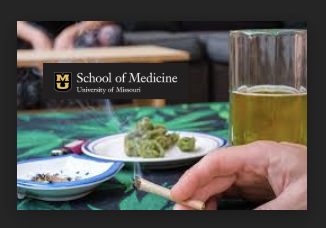Many young adults drink alcohol and use cannabis together, at the same time, as a coping mechanism or to relieve stress. A recent study from the University of Missouri School of Medicine found that people may perceive fewer negative effects of alcohol if they are also using cannabis at the same time, potentially leading to alcohol use disorder, alcohol-related harms and drunk driving.
Given how frequently people use cannabis and drink, it’s important to understand what drives simultaneous use and what its ramifications can be, study author Andrea Wycoff said.
“Studying the coping mechanisms and motivations of people most at risk for heavy use will help make substance use treatment more effective,” Wycoff said. “It may also help with prevention efforts when talking to high-risk individuals or populations.”
Wycoff’s team examined 6,334 data entries from a sample of 88 adults. Participants were prompted to fill out multiple surveys per day via a notification on their phone that asked about their substance use. If they recently drank or used cannabis, they would complete follow-up surveys asking how they felt.
“These surveys were completed in real-time, during the person’s day-to-day life,” Wycoff said. “This minimized the presence of data where people didn’t remember or misremembered how they felt, which can give us a lot of insight about how simultaneous use unfolds in everyday life.”
The adverse health effects of alcohol are well-documented; excessive drinking can lead to liver damage or failure, heart strain or damage and various other issues, including a heightened risk of cancer.
Heavy cannabis use also has adverse health consequences, especially with prolonged use starting in adolescence. Examples include cognitive impairment, impaired motor skills, altered brain development, lung damage from smoking, addiction and mental illness.
“More research is needed to determine the extent of potential positive and negative effects of cannabis, but further research should also focus on understanding the psychological processes that reinforce simultaneous use,” Wycoff said. “Research studies should include people seeking treatment for substance use, as they are one of the main groups that we are hoping to help with our research efforts.”
Andrea Wycoff, PhD is an assistant professor of psychiatry at the MU School of Medicine.
“Affective reinforcement of simultaneous versus single use of alcohol and cannabis” was published in Drug and Alcohol Dependence. In addition to Wycoff, MU study author included Timothy Trull, Curators’ Distinguished Professor and Byler Distinguished Professor of Psychological Sciences.
Read more
https://medicine.missouri.edu/news/simultaneous-alcohol-cannabis-use-may-fuel-more-drinking



















